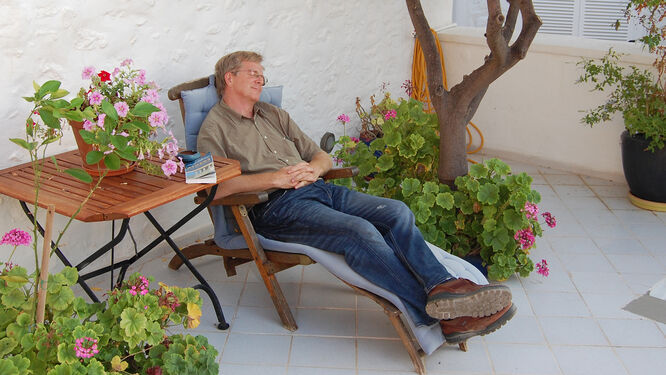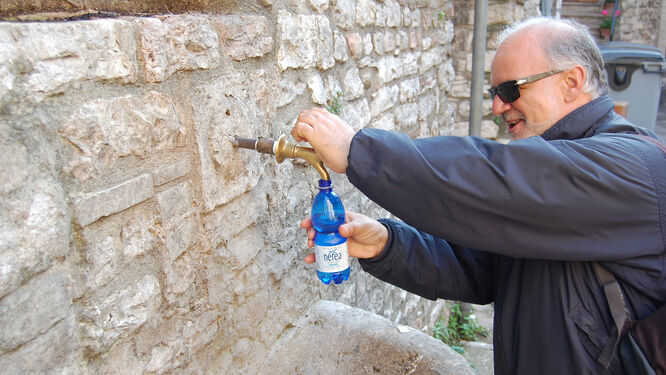Tips for Healthy, Happy Travels
By Rick Steves
Using discretion and common sense, I eat and drink whatever I like when I'm on the road. I've stayed healthy throughout a six-week trip traveling from Europe to India. By following these basic guidelines, I never once suffered from Tehran Tummy or Delhi Belly.
Take precautions on the flight. Long flights are dehydrating. I ask for "two orange juices with no ice" every chance I get. Eat lightly, stay hydrated, and have no coffee or alcohol and only minimal sugar until the flight's almost over.
Some people are susceptible to blood clots in their legs during long flights (factors include obesity, age, genetics, smoking, and use of oral contraceptives or hormone replacement therapy). You can reduce the risk by flexing your ankles and not crossing your legs while seated, taking short walks hourly, and staying hydrated; those at greatest risk can wear compression socks.
Mask up. Just like at home, travelers with suppressed immune systems and the super-vigilant may want to wear a face mask in close quarters and crowds, such as on flights or packed subways.
Eat nutritiously. The longer your trip, the more you'll be affected by an inadequate diet. Budget travelers often eat more carbohydrates and less protein to stretch their travel dollars. But protein helps you resist infection and rebuilds muscles. Supplemental super-vitamins, taken regularly, help me to at least feel healthy.
Use good judgment when eating out. Avoid unhealthy-looking restaurants. Meat should be well cooked (unless, of course, you're eating sushi, carpaccio, etc.) and, in some places, avoided altogether. If you're concerned, write the local equivalent of "well done" on a piece of paper and use it when ordering. Prepared foods gather germs (a common cause of diarrhea). Outside of Europe, be especially cautious. When in serious doubt, eat only thick-skinned fruit…peeled.
Keep clean. Wash your hands often, keep your nails clean, and avoid touching your eyes, nose, and mouth. Carry and use a hand sanitizer, such as Purell (must contain at least 60 percent alcohol to be effective against coronavirus). Remember that hand sanitizers are an adjunct to, not a replacement for, hand washing with soap and warm water.
Practice safe sex. Sexually transmitted diseases are just as common in Europe as in the US. Take precautions. Condoms are readily available at pharmacies and from restroom vending machines.
Be active. Physically, travel is great living — healthy food, lots of activity, fresh air, and all those stairs! If you're a couch potato, try to get in shape before your trip by taking long walks. People who regularly work out have plenty of options for keeping in shape while traveling. Biking is a great way to get intimate with a destination while burning calories. Though running is not as common in Europe as it is in the US, it's not considered weird either. Traveling runners can enjoy Europe from a special perspective — at dawn. Swimmers will find that Europe has plenty of good, inexpensive public swimming pools.
Whatever your racket, you'll find ways to keep in practice as you travel if you really want to. Most big-city private tennis and swim clubs welcome foreign guests for a small fee, which is a good way to make friends as well as stay fit.
Get enough sleep. Know how much sleep you need to stay healthy (generally 7–8 hours per night). If I go more than two nights with fewer than six hours' sleep, I make it a priority to catch up — no matter how busy I am. Otherwise, I'm virtually guaranteed to get the sniffles.
Give yourself a break. Europe can do to certain travelers what southern France did to Vincent van Gogh. Romantics can get the sensory bends, patriots can get their flags burned, and anyone can suffer from culture shock. Europe is not particularly impressed by America or Americans, and it will challenge many things you always assumed were above the test of reason.
On a longer trip, it can be refreshing to take a break from Europe every so often. Enjoy a long, dark, air-conditioned trip back to California in a movie theater. Loiter in the lobby of a world-class hotel, where the local culture is lost under a big-business bucket of intercontinental whitewash. Or simply stop at a Starbucks. A taste of home can do wonders to refresh the struggling traveler's spirit.
Basic First Aid
It's tempting to go, go, go while you're in Europe — but if you're not careful you might push yourself to the point of getting sick. Be proactive to stay well. If you do get sick, take action to regain your health. (See my list of first-aid items to pack from home.)

Headaches and Other Aches: Try requesting "paracetamol" to get acetaminophen (Tylenol) when you need to soothe headaches, sore feet, bruises, Italian traffic, and other minor problems.
Fever: A high fever merits medical attention, particularly for children. A normal temperature of 98.6° Fahrenheit equals 37° Celsius. If your thermometer reads 40°C, you're boiling at 104°F. You can use acetaminophen to bring down a fever, along with putting cold washcloths on your forehead for relief.
Colds: If you're feeling run-down, get lots of sleep and force fluids. (My trick during the hectic scramble of TV production is to suck on tablets of vitamin C and zinc.) Stock each place you stay with boxes of juice upon arrival. Pseudoephedrine (Sudafed) and other cold capsules are usually available but may not come in as many varieties as you're used to at home — and, as in the US, there may be limits on how much you can buy.
Abrasions: Clean abrasions thoroughly with soap to prevent or control infection, and cover with a clean bandage. First-aid supplies are readily available at phramacies throughout Europe.
Blisters and Chafing: Moleskin, cushioned blister bandages, tape, or double-layer socks can prevent or lessen problems with your feet. Cover any irritated area before it blisters. Avoid problems by breaking in your shoes in advance and wearing good socks. Many walkers swear by anti-blister balm sold in running shops and sporting-goods stores (apply it anywhere friction may cause a problem).
Sprains: All those cobblestones can be tough on ankles. If you get a sprain, try to cut back on activities that could aggravate the injury. The best advice is to ice and elevate any sprain periodically for 48 hours. A package of frozen veggies works as a cheap ice pack. If your foot or leg is swollen, soak it in cold water in a bathtub or swimming pool. When sitting around isn't an option, use an Ace bandage or air cast to immobilize, reduce swelling, and provide support. If you can't walk, consider renting a set of crutches or a wheelchair: Ask your hotelier for help. Take regular doses of an anti-inflammatory drug like ibuprofen (Advil, Motrin).
Motion Sickness: To be effective, medication for motion sickness — such as dimenhydrinate (Dramamine) or cyclizine (Marezine) — should be taken one hour before you think you'll need it. These medications can also serve as a mild sleep aid. Meclizine (Bonine) also treats motion sickness but may cause less drowsiness. Acupressure bands worn on the wrists help some people.
Allergies: Even those immune to pollen or cat dander at home might come down with allergies when exposed to unfamiliar flora and fauna. You might not find Claritin in Europe, but you can get the generic equivalent, loratadine. For an antihistamine like Benadryl, request diphenhydramine.
Diarrhea: Get used to the fact that you might have diarrhea for a day. If you get the runs, take it in stride. It's simply not worth taking eight Pepto-Bismol tablets a day or brushing your teeth in Coca-Cola all summer long to avoid a day of the trots. I take my health seriously, and for me, traveling in India or Mexico is a bigger health concern. But I find Europe no more threatening to my stomach than the US.
I've routinely taken groups of 24 Americans through Turkey for two weeks. With adequate discretion, we eat everything in sight. At the end of the trip, my loose-stool survey typically shows that five or six travelers coped with a day of the Big D and one person was stuck with an extended weeklong bout.
If you get diarrhea, don't panic: it will run its course. Make your diet as bland and boring as possible for a day or so (bread, rice, boiled potatoes, bananas, clear soup, toast, weak tea). Keep telling yourself that tomorrow you'll feel much better. You likely will. But if loose stools persist, drink lots of water to replenish lost liquids and minerals.
Don't take antidiarrheal medications if you have blood in your stools or a fever greater than 101°F (38°C) — you need a doctor's exam and antibiotics. A child (especially an infant) who suffers a prolonged case of diarrhea also needs prompt medical attention.
I visited the Red Cross in Athens after a miserable three-week tour of the toilets of Syria, Jordan, and Israel. My intestinal commotion was finally stilled by a recommended strict diet of boiled rice and plain tea. As a matter of fact, after five days on that dull diet, I was constipated.
Constipation: With all the bread you'll be eating, constipation, the other side of the intestinal pendulum, is (according to my surveys) as prevalent as diarrhea. Get exercise, drink water, and eat food with lots of fiber (raw fruits, leafy vegetables, prunes, or bran tablets from home). Drinking herbal tea helps many people get moving again. If that fails, try laxatives or stool softeners, and everything will come out all right in the end.

